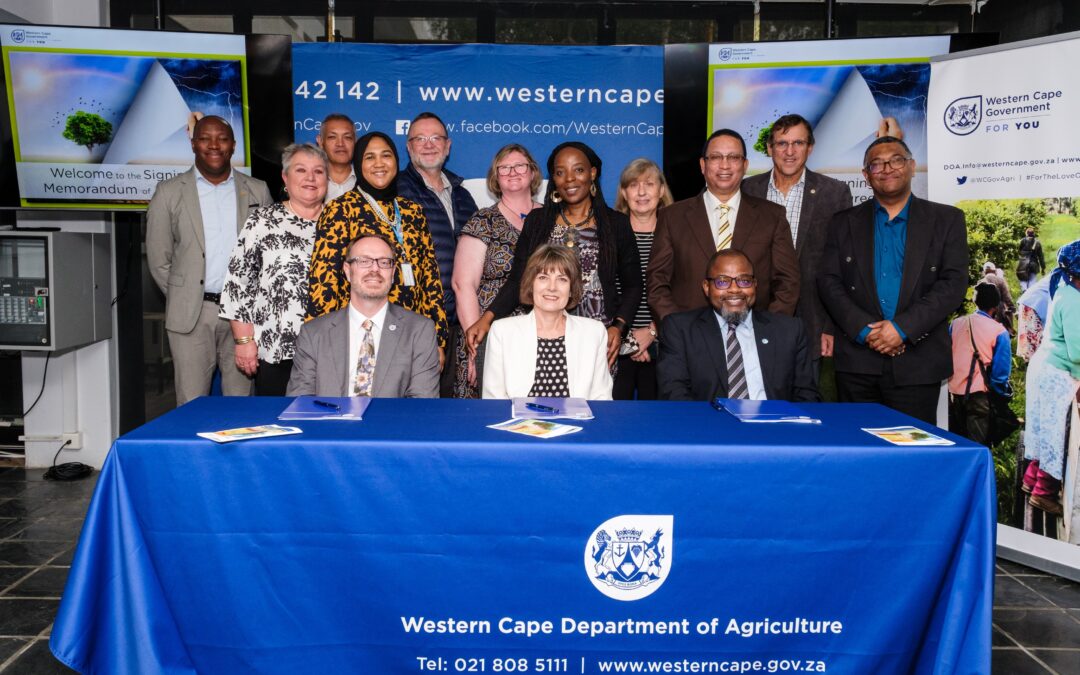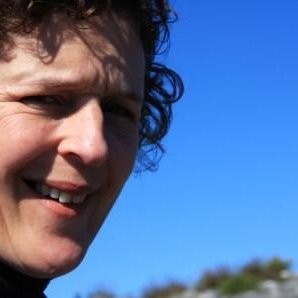Research on the impacts of climate change on agriculture and communities in the Western Cape were high on the agenda during the signing of a Memorandum of Agreement (MoA) between Stellenbosch University’s School for Climate Studies and the Western Cape Government’s Department of Agriculture and Department of Environmental Affairs and Development Planning. The MoA was signed during a special ceremony on Monday 6 November 2023 at the Head Office of the Department of Agriculture at Elsenburg, Stellenbosch. It addresses issues such as collaborative research and joint projects with national and international partners, as well as opportunities for postgraduate students to participate in the Department of Agriculture’s Young Professional Persons Programmes.
In his address, the Western Cape Minister of Agriculture, Ivan Meyer, emphasised the importance of research to provide evidence-based data on which government structures can base their decisions in the best interests of the farmers and citizens of the Western Cape and South Africa:
“Not only do we value, appreciate and understand the value of research, but we also act on it. This MoA will provide new impetus to ongoing work by the Western Cape government to ensure a climate-resilient future for the province,” he said.
Minister Anton Bredell, Western Cape Minister of Local Government, Environmental Affairs and Development Planning, said in a statement that the MoA will provide a solid and enabling platform to pursue local and international research and capacity building opportunities to build the climate change knowledge based in the Western Cape:
“It will also enable the exchange of scientific and institutional expertise within the partnership and with global partners to drive a more rapid transition towards climate change adaptation, mitigation and a climate-resilient province”.
In her response, Prof. Sibusiso Moyo, Deputy Vice-Chancellor: Research, Innovation and Postgraduate Studies at SU, said SU welcomed the partnership as another example of how collaboration and interdisciplinary research can be used to tackle the complex societal issues we are dealing with today: “The signing of this MOA highlights the important role of the university in the continuous development of the province. Research conducted by the School for Climate Studies will be pivotal in the development and application of climate-related solutions and technologies that address issues on the broader social agenda, which include job creation, skills training, poverty alleviation and inclusivity”. Also present at the signing ceremony were Dr Mogale Sebopetsa, Head of the Provincial Department of Agriculture, and Mr Gerhard Gerber, Head of the Provincial Department of Environmental Affairs and Development Planning. In his message Dr Sebopetsa said while climate change presents a major risk, it also presents us with opportunities to do things differently:
“Climate change poses a threat to food security, public health and the emergence of new diseases. We need to work together to know how best to move forward to take from the environment only what we need and protect it for future generations”.
Mr Gerber emphasised in his message how important it is to base decision-making on the best emergent strategies and to ground those strategies in everyday practice:
“The key thing is for our farmers and communities to become more resilient in the face of a changing climate,” he said.
According to Ministers Meyer and Bredell, co-leaders of Climate Change governance in the Western Cape, the signing of the agreement is testimony to the Western Cape Government’s drive towards climate change resilience. Climate change projections for the Western Cape suggest a likelihood of more frequent and more intense extreme weather events threatening food security and economic growth. These trends highlight the need for a coordinated response from government, tertiary institutions and the private sector to mitigate the impact of climate change. SU’s School for Climate Studies, launched in 2021, combines climate-related knowledge across different fields with the public sector’s climate policies and initiatives, as well as with the private sector’s redress and innovation capacities – all in support of a just transition to a climate-resilient society and a sustainable, low-carbon economy. It is currently led by its Director, Prof Guy Midgley.
On the photo, in front (from left): Gerhard Gerber (Head of Department, Department of Environmental Affairs and Development Planning), Prof. Louise Warnich (Dean: Faculty of Science, Stellenbosch University); Dr Mogale Sebopetsa (Head of Department, Western Cape Department of Agriculture)
Directly behind them: Dr Ilse Trautmann (Deputy Director General: Agricultural Research and Regulatory Services), Ashia Petersen (Programme Manager: Sustainable Resource Use Management, Western Cape Department of Agriculture); Prof. Sibusiso Moyo (Deputy Vice-Chancellor: Research, Innovation and Postgraduate Studies, Stellenbosch University), Minister Ivan Meyer, Western Cape Minister of Agriculture) and Darryl Jacobs (Deputy Director General: Agricultural Development and Support Services).
At the back: Sibusiso Lukhele (project coordinator at SU); Minister Anton Bredell (Western Cape Minister of Local Government, Environmental Affairs and Development Planning), Karen Shippy (Chief Director, Environmental Sustainability, Western Cape Department of Environmental Affairs and Development Planning), Prof. Stephanie Midgley (African Climate and Development Initiative, University of Cape Town) and Prof. Danie Brink (Dean: Faculty of AgriSciences, SU).


